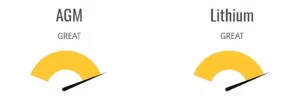In energy storage, two popular options have emerged as frontrunners: AGM (Absorbent Glass Mat) batteries and Lithium batteries. Both types offer distinct advantages and have specific applications where they excel. Choosing the correct battery for your needs requires thoroughly understanding its characteristics, benefits, and drawbacks. This article will delve into the details of AGM and Lithium batteries, comparing their features, performance, and suitability for various applications.

Part 1. What is an AGM battery?
AGM batteries are lead-acid batteries that utilize an absorbent glass mat to separate the battery plates. This design immobilizes the electrolyte, making AGM batteries spill-proof, vibration-resistant, and maintenance-free. They are known for their reliability, deep cycling capabilities, and ability to deliver high bursts of power.
Advantages:
- >Deep Cycling Capabilities: AGM batteries can handle deep cycling, meaning they can be discharged and recharged repeatedly without significant loss in capacity.
- High-Burst Power: AGM batteries can deliver high bursts of power, making them suitable for applications that require a quick and powerful energy release.
- Cost-Effectiveness: AGM batteries are generally more affordable upfront than Lithium batteries, making them a cost-effective choice for specific applications.
- Maintenance-Free: AGM batteries are virtually maintenance-free, eliminating the need for periodic watering or equalization charging.
Disadvantages:
- Limited Cycle Life: AGM batteries typically have a shorter cycle life than Lithium batteries, meaning they may need to be replaced more frequently.
- Heavier and Bulkier: AGM batteries are heavier and bulkier due to their lead-acid chemistry and construction, which can disadvantage weight-sensitive applications.
- Lower Energy Density: AGM batteries have lower energy density than Lithium batteries, meaning they can store less energy in the same volume or weight.
- Slower Charging Time: AGM batteries generally require longer charging times than Lithium batteries, which can be a drawback in situations where quick charging is necessary.
Part 2. What is a lithium battery?
On the other hand, lithium batteries are rechargeable batteries that use lithium ions to store and release energy. They are known for their high energy density, lightweight construction, and long cycle life. Lithium batteries offer excellent performance, high efficiency, and compact size, making them popular for portable electronics and electric vehicles.
Advantages:
- High Energy Density: Lithium batteries have a higher energy density than AGM batteries, allowing them to store more energy in a smaller, lighter package.
- Lightweight and Compact: Lithium batteries are lightweight and compact, making them suitable for portable devices and weight-sensitive applications.
- Long Cycle Life: Lithium batteries have a longer cycle life than AGM batteries, which can withstand more charge-discharge cycles before capacity degradation.
- High Charging and Discharging Efficiency: Lithium batteries offer high charging and discharging efficiency, resulting in faster charging times and better-stored energy utilization.
Disadvantages:
- Higher Initial Cost: Lithium batteries generally have a higher upfront cost than AGM batteries, which can be a barrier to entry for some applications.
- Safety Concerns: Lithium batteries require proper handling and charging practices to mitigate safety risks associated with higher energy density.
- Potential for Thermal Runaway: If mistreated or damaged, Lithium batteries can experience thermal runaway, a rapid increase in temperature that can lead to fire or explosion.
- Recycling Challenges: The recycling process for Lithium batteries can be complex and costly, posing challenges for proper disposal and environmental sustainability.
Part 3. Difference between AGM and lithium battery
Capacity and Energy Density
Capacity refers to the amount of energy a battery can store. In contrast, energy density measures the energy stored per unit mass or volume. Lithium batteries have a higher energy density than AGM batteries, meaning they can store more energy in a smaller, lighter package. This advantage makes Lithium batteries ideal for applications where weight and space are critical factors.
Cycle Life
Cycle life indicates the number of charge-discharge cycles a battery can undergo before its capacity declines significantly. Lithium batteries typically have a longer cycle life compared to AGM batteries. While AGM batteries can provide around 200-500 cycles, Lithium batteries can surpass 1000 cycles or even more, depending on the specific chemistry and usage conditions. Therefore, Lithium batteries offer exceptional longevity and can withstand frequent deep cycling without a significant loss in capacity.
Charging and Discharging Efficiency
Efficiency in charging and discharging is an essential factor to consider when evaluating battery technologies. Lithium batteries exhibit a higher charging and discharging efficiency compared to AGM batteries. They can accept charge faster and discharge energy more efficiently, resulting in less energy loss. This efficiency advantage translates into faster charging times and better-stored energy utilization.
Weight and Size Considerations
Lithium batteries take the lead if weight and size are paramount for your application. Their lightweight construction and compact size make them an excellent choice for portable devices, electric vehicles, and other weight-sensitive applications. While reliable and robust, AGM batteries are heavier and bulkier due to their lead-acid chemistry and construction.
Safety and Maintenance
When it comes to safety, both AGM and Lithium batteries have their pros and cons. AGM batteries are considered safer regarding thermal runaway and fire risk, making them suitable for applications where safety is a primary concern. On the other hand, Lithium batteries require additional safety precautions due to their higher energy density and the potential for thermal runaway if mistreated or damaged. Proper usage, handling, and charging practices are crucial to ensure the safe operation of Lithium batteries.
In terms of maintenance, AGM batteries have the advantage of being virtually maintenance-free. They do not require periodic watering or equalization charging like traditional lead-acid batteries. Once properly installed and set up, lithium batteries offer a maintenance-free experience.
Cost Comparison
Cost is a significant consideration when choosing between AGM and Lithium batteries. AGM batteries are generally more affordable upfront than Lithium batteries, which can have a higher initial investment cost. However, it’s essential to consider the total cost of ownership over the battery’s lifespan. Lithium batteries often provide better long-term value due to their longer cycle life, higher efficiency, and reduced maintenance requirements. Additionally, as Lithium battery technology advances and becomes more prevalent, prices will likely decrease, making them more competitive in the market.
Applications
Both AGM and Lithium batteries have their specific areas of expertise and are suited for different applications:
AGM batteries are commonly used in automotive starting applications, recreational vehicles, boats, and backup power systems. Their ability to deliver high bursts of power makes them ideal for applications that require a reliable starting source and occasional deep cycling.
Lithium batteries are extensively used in portable electronics, electric vehicles, renewable energy systems, and off-grid applications. Their high energy density, lightweight construction, and long cycle life make them suitable for situations where compact size, weight reduction, and long-term performance are vital.
Note: Choosing the right battery technology depends on the specific requirements of your application. Consider factors such as power demands, space limitations, weight constraints, cycle life expectations, and long-term cost implications to make an informed decision.
Part 4. FAQs
-
Are AGM batteries better?
AGM batteries have advantages like reliability and deep cycling capabilities, but whether they are better depends on specific needs and preferences. -
Can I replace my AGM batteries with lithium?
Yes, replacing AGM batteries with lithium batteries is possible, but compatibility and application requirements should be considered. -
Are AGM or lithium batteries safer?
AGM batteries are generally considered safer regarding thermal runaway and fire risk than lithium batteries. However, both battery types require proper handling, storage, and charging practices to ensure safety. -
What kills AGM batteries?
Overcharging, undercharging, excessive heat, deep discharging, and poor maintenance can harm AGM batteries. -
What is the lifespan of an AGM battery?
AGM batteries can last around 3 to 5 years, but proper maintenance can help extend their lifespan.
Related Tags:
More Articles

Overview of Deep Cycle Lithium Battery
In this article, we explore the life, voltage, capacity, and charging considerations of deep cycle lithium batteries.
How Long do Lithium Batteries Last?
How long do lithium batteries last? we will explore the factors that influence the lifespan of lithium batteries and provide insights into their longevity.
How to Choose the Best LiFePO4 Battery?
Choose LiFePO4 batteries for superior performance, safety, and versatility in EVs, UPS, and backup power. This guide helps you make informed decisions.
Get 12v Lithium Car Battery As a Power Source for the Ride
Make the right choice for your vehicle's battery needs by installing a 12 volt lithium car battery. You will enjoy maintenance-free longevity with this change.
Everything About A Small Lithium Ion Battery
Discover the features, uses & future potential of a small lithium ion battery. A compact and tiny powerhouse ideal for smartphones, wearables, drones & more.





